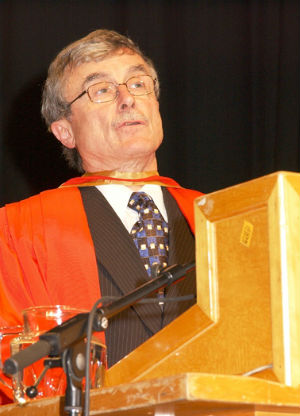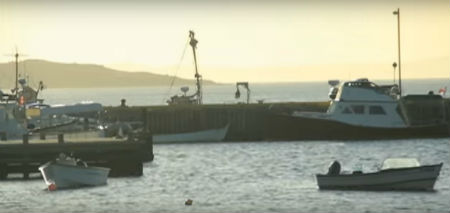Dr. Davis Earle (1937-2016) – A Life Well Lived
By Neil Earle
 Dr. Davis Earle
Dr. Davis EarleThe passing of Eric Davis Earle at Deep River, Ontario this December – Rhodes Scholar, humanitarian, nuclear physicist and contributor to the 2015 Nobel Prize for physics – spurs reflection among many of us who grew up in Carbonear in the 1950s.
I was 11 years old when I heard how “Dave,” a third cousin of mine, had won the 1959 Rhodes scholarship out of the University of British Columbia. The whole town seemed to bask in the after-glow. When Dave came back to visit I was a callow 11 year old who kept quizzing him outside the Earle Freighting Service store one day on where his “boat” was, thinking in my naïveté that he had won a boat (as in scholar-SHIP, right?). Dave good-naturedly tagged along and pointed down to Earles’ wharf, “Lots of boats down there, Neil, boy.”
That’s one thing Dave and I had in common – working in the Earle Freighting Service general store under the zestful tutelage of my father, George W. Earle. This was a time when Dave’s father Captain Guy Earle and Guy’s brother Fred, were developing one of the most dynamic and innovative fishery enterprises in the island – Earle Freighting Service, Ltd. of Carbonear.
On his way back from Oxford with a Doctor of Philosophy degree in 1964 Dave showed off a snazzy British sports car and was prepared to head to Chalk River to work on the Canadian nuclear reactor project. This was the first prototype nuclear reactor outside the United States – part of the Canadian work on the Manhattan Project. American journalist Gordon Lore tells the story in understandable terms in his 2015 book The Earles of Newfoundland and Labrador (DRC Publishing, St. John’s). After two nuclear leaks in the 1950s (one of them featuring future U.S. President Jimmy Carter as engineer on the clean-up crew) the Chalk River Laboratory (CRL) went on to (safely) produce about one-third of the world’s supply of medical isotopes, a sterling example of one of Davis Earle’s passions – the peaceful uses of science for the benefit of humanity.
During this time Dave lived with his growing family in Deep River near the CRL facility about 124 miles northwest of Ottawa. In 1984 he joined a group of scientists as associate director of a major enterprise, a cutting edge research project known as the SNO or Sudbury Neutrino Observatory. His was the task of constructing a subterranean building in an abandoned mine 6800 feet underground with a heavy water Cherenkov reactor designed to better detect neutrinos produced by fusions in the sun.
 Carbonear, Newfoundland and Labrador is 90 kilometres from the capital of St. John's.
Carbonear, Newfoundland and Labrador is 90 kilometres from the capital of St. John's.Fishing for Neutrinos – Underground
Being underground the observatory better analyzed all three known neutrino types. Neutrino is from an Italian word meaning “”little neutral ones” and their analysis is tied to, in the words of Dave’s brother, Dr. Phil Earle, “future directions in the areas of dark matter and dark energy.” These researches affect our views of how the universe was formed. Neutrinos are part of the building blocks of matter and the all-important electrons (think "electricity") and hence a potential bonanza for practical users of this ground-breaking research. Dave built the reactor and then helped coordinate an international team of about 150 researchers.
In 2015 Project Director Dr. Ian McDonald invited his colleagues – including Dr. Davis Earle – to join him in Stockholm, Sweden to receive the Noble Prize in Physics. Earlier, at his reception of an honorary doctorate in science at Memorial University in 2004, Dr. Earle's project was hailed as "one of the wonders of the world” though he joked in his humble way that the acronym SNO did not mean he was in a “flaky” profession. He typically used the occasion as a platform to encourage his MUN audience of future scientists to look for “applied benefits” in studying science, to "help us understand our universe and ourselves better and make for a more civilized society.” That was Dave, humanitarian to the core, values aided and abetted by his years at the old United Church High School.
Dr. Davis Earle's early roots in Carbonear have been seen as attuning him to investigate the natural world, nurturing a straight-forward thirst for knowledge, and above all to “Launch out into the deep” – echoing his alma mater Memorial University’s motto, one tied to our common nautical heritage. As MUN’s public orator claimed in 2004: “His boyhood interest in the properties of the universe (was) first sparked by the sun and the stars shining across the waters of Conception Bay.” This may or may not be so but Davis Earle never forgot his roots. Under the careful guidance of his mother, Mildred (Davis) Earle, and the intellectual stimulation provided by his astute grandfather, accountant Frank Davis, Dave used his early years as a springboard for his clear-minded but often jocular Newfoundland reading of the world, a trait praised in him at his testimonial in Deep River on January 7.
As his brother Phil summarizes: “One can only imagine how it must have felt to know your life’s work has influenced the next generation of young minds the world over.” His name is well worth its place on the Wikipedia listing under “Carbonear.” Former Earle Freighting Service employee and co-worker, Roy Saunders, agrees with those outside his family that, indeed, “Dave” Earle’s life and life’s commitments ennobled those who knew him.